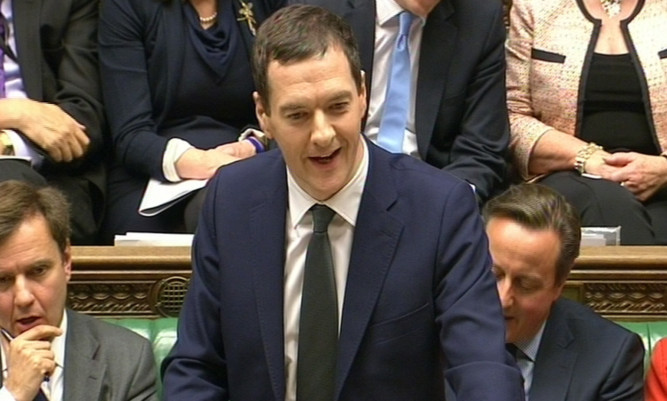George Osborne has performed a spectacular U-turn by shelving his controversial plan to cut tax credits for low-paid workers and families.
Millions of people including more than 50,000 in Tayside and Fife faced losing about £1,500 a year under the Chancellor’s plans.
Many expected him to mitigate the impact of the cuts in the wake of strong opposition in his Autumn Statement today. But he decided to bin his proposals altogether.
Mr Osborne said told MPs: “I’ve had representations that these changes to tax credits should be phased in.AS IT HAPPENED: Autumn Statement and Spending Review“I’ve listened to the concerns. I hear and understand them.
“And because I’ve been able to announce today an improvement in the public finances, the simplest thing to do is not to phase these changes in, but to avoid them altogether.”
https://youtube.com/watch?v=myZFL2jckmU%3Frel%3D0
The stepdown was dubbed “humiliating” by Stewart Hosie, the SNP’s deputy leader.
Labour’s only Scotland MP Ian Murray said it demonstrates the “total chaos” in the Chancellor’s management of public finances.
Scottish Conservatives leader Ruth Davidson, who was among a large number of Tories opposing the Chancellor’s tax credit proposals, applauded him for listening.
The moment John McDonnell pulled out Mao's little red book https://t.co/34YPjzWUep #SpendingReview https://t.co/0cHqfarU5H
— BBC News (UK) (@BBCNews) November 25, 2015
The Chancellor, who also promised that the £12 billion of cuts to the welfare budget would still be delivered in full, was laying out the Government’s spending plans over the next five years.
Other announcements included:Flights from Dundee to Amsterdam will go ahead after Government agrees to subsidise the service. The Office for Budget Responsibility predicts that North Sea oil revenues will be down by 94% this year on last, which Mr Osborne said would have meant “catastrophic cuts to Scottish public services” under an independent Scotland. Scotland’s block grant will be more than £30bn in 2019, with capital spending in Scotland rising £1.9bn to 2021. Cuts in day-to-day spending to major departments: transport (37%), environment (15%), and energy (22%). Department of Work and Pensions budget to be cut by 14%. Defence budget to go up £34bn to £40bn by 2020 and the security services to get more funding. Changes to housing benefit will see new social tenants’ entitlement capped at the same level as private tenants and housing benefit and pension credit payments stopped for people who leave the country for more than one month.For full coverage of the statement, and what it means for you, see Thursday’s Courier or try our digital edition.
